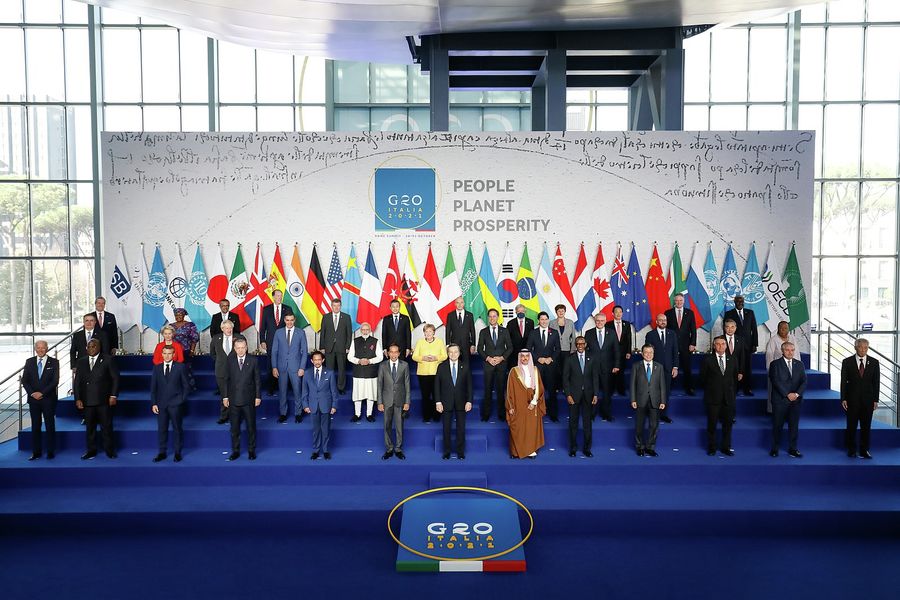
Emission Impossible II
‘In the final hours to save the world, the negotiators descended in the circle of hell Dante forgot: diplomacy’: Violet correspondent Florence Brockman brings us the second part of her investigation into the G20′s fight against the climate crisis

Last week, as the green G20 gang descended on Gas-glow, the world watched on. It certainly rolled out the red carpet for climate royalty (although you decide for yourself what Salt Bae was doing there) but the Emission Impossible bombed at the box office. Even the Prime Minister didn’t have the stamina to complete the two-week cinematic extravaganza. After going out all guns blazing in that game of fishing battleships with Macron last week, diplomacy seemed dull in comparison. A quick nap could be excused, couldn’t it? Boris floated off into his own green capitalist utopia, impenetrable to the glare of David Attenborough sitting beside him. It seemed his fellow leaders were stifling yawns too. After consuming a quick carbon-neutral croissant, looking serious, and suggesting some zero-carbon claims, our saviours disappeared, leaving only the lingering smell of petroleum on the runway.
The plot in disarray, a mass resignation of the stellar cast, Emission Impossible flailed helplessly. Cue the civil servants. Hired as extras, they now found themselves as stars of the show, negotiating a way to save the world. Knowing that 1/8 of us will be boiled to death if the temperature rises above 2°C is enough for anyone to break out in a sweat. In the final 48 hours to save the world, the negotiators descended in the circle of hell Dante forgot: diplomacy.
Yet, there would be no drama for Alok Sharma. Ice cold in the pressure cooker, he demanded a ‘final injection’ to reach an agreement. Of what, Alok? Money from Tory donors? In an attempt to recharge the Earth’s batteries, the negotiators had run dry. Tightly wound at the start of the conference, their mechanisms had begun to fail. The drone of ‘deeee-forrest-aaaaay-cion’ and ‘meeeee-thayyyne’ hummed around, giving everyone tinnitus, until someone had the sense to rewind them. No Drama Sharma was even stuck on an IV of Irn Bru for good measure.
“‘Solve it!! Solve it! Keep 1.5°C alive’ cried Johnson, as he floated on the sea of sludge.”
Just as 450 organisations pledged to invest in clean technology, it was the Houses of Parliament that could do with some cleaning up. The Thames Barrier just about manages to keep London dry from the rising sea levels, but is powerless against the torrent of Tory sleaze flooding Westminster. After refusing to cut sewage discharges last month, the MPs were truly wallowing in their own mess now the stench of unlawful lobbying and rewriting democracy filled the chambers. Much to Jacob Rees Mogg’s delight, Westminster had returned to the days of the Great Stink. Finally! Mogg donned his top hat, hopped on his penny-farthing, and pedalled off to Parliament, with a briefcase full of Somerset Capital cash, deaf to the cries of democracy. It’s 1853, who needs it anyway?
Even the stench became too much for the disgraced Owen Patterson: Parliament remained a shit that could not be shifted. No amount of hand sanitiser from Ian Duncan Smith’s cushy second job with a Byotrol could clean up this mess. Floating around the Commons in a rubber ring, Johnson needed an almighty big plunger to unblock this scandal. It was just the case of coming up with a big enough distraction. Trapping a caver in the Brecon Beacons (everyone’s a sucker for a good rescue story)? Breaking the Northern Ireland Protocol? There surely must be something to act as a distraction.
But wait — COP26! The blockbuster’s conclusion was finally on the horizon. What better way to speed things up than a few words from the Prime Minister? ‘Solve it!! Solve it! Keep 1.5°C alive’ cried Johnson, as he floated on the sea of sludge. With three minutes until the credits rolled on COP26, the negotiators snapped into action, giving the Duracell bunny a run for his money. And, after a post-credit intervention from India and China, Alok Sharma, who looked like he had more Irn Bru bubbles than red blood cells in his bloodstream, staggered onto the podium. Rumour has it he even emitted a soft orange glow, not unlike the light pollution over London. It was under this glow that the Glasgow Climate Pact was born.
So it was over. After months in development hell, a painstaking plotline, and too many characters to keep track of, the end credits finally descended on COP26. Leaving the cinema and seeing daylight for the first time in two weeks, Alok Sharma wept. Of relief, of disappointment, or perhaps just conjunctivitis; we can’t be sure.
What is certain however is the next instalment, COP27, is already in production.

